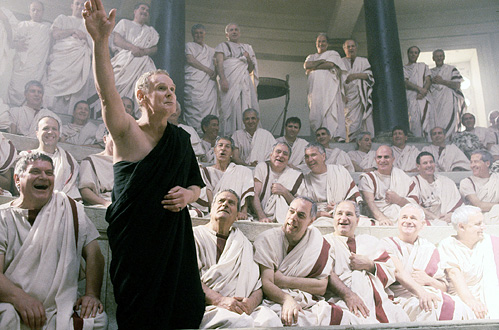The Death of the Roman Republic November 3, 2013
Author: Beach Combing | in : Ancient , trackbackThere is nothing in history to equal the death of the Roman Republic. On the one hand, a bunch of power-hungry opportunists including Caesar, Pompey, Augustus, Mark Anthony and Crassus. Then, on the other, the last defenders of Republican liberty: Cato, Cicero, Brutus and their many ‘sometime’ supporters in the Senatorial Class. The power-hungry opportunists have had an important insight. They have realized that the Senate, the city council of Rome, cannot govern a Mediterranean Empire; that should the Senate and its quasi-democratic adjuncts continue to govern, then Rome and its provinces will collapse and follow Carthage, Athens and the rest into the elephant graveyard of history. Cato, Cicero and their kin don’t agree and, in any case, for them, dictatorship and loss of Roman freedom is simply too high a price: their secret insight and one that we have all but forgotten today is that democracy and freedom are not the same things. It is easy at two thousand years remove to caricature those on both sides: the populares had patriotic motives; the optimates could often show a shocking lack of principle in the face of power. But the battle was horribly real. Cicero, to take one of many examples, was decapitated, his hands were nailed to the wall and his dead tongue was stabbed repeatedly with a pin by his enemy’s wife.
After having spent a week or two rereading some notable histories of the same, what strikes this blogger, is how, in purely practical terms, Caesar and Pompey were right. It was a question of reform or death. Rome would not survive another century of senatorial rule. Most modern historians know this and yet they hate themselves for thinking that the ‘awful revolution’ was also the necessary revolution. There is though another position that is difficult even to articulate because it goes against all our instincts about the past and about ourselves: entropy. We can say that Caesar and Pompey were correct about the practicalities but wrong, horribly wrong about the bigger picture. The death of Rome, ‘the nation that sold its soul for the fruits of the known world’, would have been infinitely preferable to its zombie survival under Nero, Diocletian and Constantine. The Roman Empire, as opposed to the Roman Republic, is an example of an institution that defied the laws of historical gravity against the interests of its own ‘citizens’ and those of its neighbours for centuries. A dozen successor states or even long-haired, butter-greased barbarians would have been preferable to the proscriptions of Mark Anthony. Cato ripping his own intestines out or Cassius Chaerea choosing his death knew this all too well. They were speaking to virtue and to the ages: not to party interests. What a period: it is as if power has been personified in its various aspects and then reduced to a high octane soap opera. Other thoughts? drbeachcombing AT yahoo DOT com
5 Nov 2013 Canadian Chris writes: I recently read Terry Jones’ (of Monty Python fame) book ‘Barbarians’, which was an exploration of the neighbouring cultures that bordered early Rome. The core point is that, as we learn more about them, a different picture emerges of the Romans: opportunistic in the extreme, amoral to a truly unholy degree, and somewhat doomed right from the start largely due to the corrosive corruption that can follow such unparalleled success. While clearly masters of the battlefield, they were also masters of propaganda, leading to a belief that has held right up to today that they were the pre-eminent civilization while everyone else were mere ‘butter greased’ savages. This largely hollow belief is finally being challenged by new discoveries, and as the book concludes, perhaps it was they who were the real ‘barbarians’. While their many accomplishments are well known, in the end their propaganda was so successful that it’s taken us nearly two thousand years to finally see through it.*** James H. agrees that the subject is a fascinating one: You’re right their history had it all, not even the Celestial Kingdom can compare. So much, rule of law vs might makes right, morals of society or lack of, who tells the stories of that time that we read today and what axe did they have to grind? *** MC looks bottom up: One wonders what the average Roman made of it all. I suspect it was a case of “here we go again.” As dramatic as the end of the republic was, it had all happened before in the civil war between Marius and Sulla. Sulla’s proscriptions had decimated the senatorial class (Caesar himself barely escaped alive), and the republican system, in hindsight, was on life-support already. Thanks James, MC and CC!



